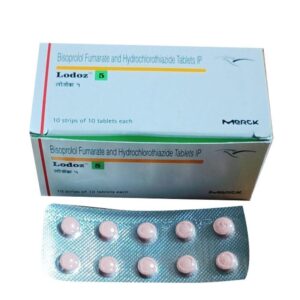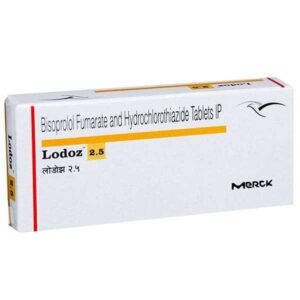HYDROCHLOROTHIAZIDE + BISOPROLOL
Hydrochlorothiazide: Hydrochlorothiazide is a medication primarily used to treat high blood pressure (hypertension) and fluid retention (edema) caused by various conditions, such as congestive heart failure, kidney problems, and liver cirrhosis. It belongs to a class of drugs called thiazide diuretics, which work by increasing the amount of urine produced, thereby removing excess salt and water from the body.
The main mechanism of action of hydrochlorothiazide is to inhibit the reabsorption of sodium and chloride ions in the distal convoluted tubules of the kidneys. This leads to increased excretion of sodium, chloride, and water, resulting in a decrease in blood volume and a subsequent decrease in blood pressure.
The usual starting dose of hydrochlorothiazide for hypertension is 12.5-25 mg orally once a day. The dose may be titrated upwards depending on the individual’s response and the severity of their hypertension. For edema, the dose may range from 25-100 mg orally, once per day or in divided doses.
As with any medication, hydrochlorothiazide is associated with certain side effects. Common side effects may include increased urination, dizziness, lightheadedness, headache, muscle cramps, weakness, nausea, and electrolyte imbalances. Rare but serious side effects include severe allergic reactions, irregular heartbeat, electrolyte depletion, low blood pressure, and pancreatitis.
It is important to note that hydrochlorothiazide should be used cautiously in patients with underlying kidney or liver disease, as well as in individuals with diabetes or gout. It may interact with other medications, such as lithium, digoxin, and certain blood pressure medications.
As always, it is crucial to consult with a healthcare professional for guidance on the appropriate use, dosage, and potential side effects of hydrochlorothiazide.
Bisoprolol: Bisoprolol is a medication that belongs to the class of drugs called beta-blockers. It is commonly prescribed for the treatment of various conditions, including high blood pressure (hypertension), heart failure, and certain heart rhythm disorders, such as atrial fibrillation.
The primary mechanism of action of Bisoprolol is its ability to block the effects of certain chemicals in the body, such as adrenaline (epinephrine). By doing so, it reduces the workload on the heart, resulting in slowed heart rate and reduced blood pressure. This helps to improve heart function and decrease the risk of cardiovascular events.
The usual starting dose of Bisoprolol for hypertension is 5 mg once daily, although the dose may be adjusted depending on the individual’s response. For heart failure, the starting dose is usually 1.25 mg once daily and gradually increased to a maintenance dose of 10 mg once daily. The dose for heart rhythm disorders may vary depending on the specific condition being treated.
Like any medication, Bisoprolol may cause certain side effects. Common side effects include fatigue, dizziness, headache, slow heart rate, low blood pressure, and cold hands and feet. These side effects are usually mild and temporary. However, more serious side effects can occur in rare cases, such as allergic reactions, worsening heart failure symptoms, and difficulty breathing. It is important to report any unusual or severe side effects to a healthcare professional.
It is worth noting that Bisoprolol should not be stopped suddenly without first consulting a doctor, as this can lead to a rebound effect and worsen symptoms. Gradual dose reduction may be necessary to safely discontinue the medication.
As with any medication, it is crucial to follow the prescribed dose and consult a healthcare professional for personalized advice and guidance.


